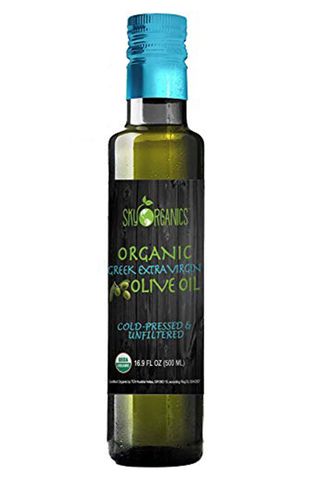

This season (and the next one, too, if we’re being honest) was all about the glow-up, specifically getting your skincare program smart and sharp so that your natural radiance shines on. Some of us took to a multi-step, daily routine to get our glimmer on, while others opted to keep it simple, looking for their skincare products right at home. You might be surprised to hear that one of the best places to look for your next favorite moisturizer might be your kitchen.
Mayo, eggs, sugar, and avocado are just some of the key ingredients in homemade skincare. But have you also considered adding olive oil for skin benefits? We asked experts for their take on the matter.
Is it good to put olive oil on your skin?
The verdict from experts is mixed when it comes to olive oil for skin, says Ming Zhao, CEO of PROVEN Skincare, a female-led company that creates tailor-made beauty products.
“While olive oil generally has high safety and low comedogenic ratings, for people with very sensitive, dry or eczema-prone skin, olive oil can incur further damage to the skin barrier,” she says. Trying to treat dryness in sensitive skin with olive oil is a flat-out no-go, according to Zhao. “At PROVEN, we prefer to use plant-derived squalane (harvested from olives, wheat germ oil and rice bran) to treat dry or sensitive skin. It is both calming and highly moisturizing.”
Diana Gall, M.D., a general practitioner at Doctor4U, a confidential online doctor service based in the U.K, also weighs in: “Olive oil has many health benefits, particularly for your skin. It’s an antioxidant, so it prevents oxidation of the skin and may prevent premature aging and sun damage,”
What can olive oil do for my skin?
Although the real nutrition for your skin comes from what you eat, Gall says, using olive oil externally can also have positive effects on skin. “Olive oil is rich in vitamins A, D, E, and K,” she says. Each of these benefits the skin in their own way. The leader of that pack is vitamin E; it’s an antioxidant that protects the skin from damage caused by free radicals. “Oxidation produces free radicals in the body which are a normal and natural process,” Gall explains. “However, when more free radicals are produced than we need, this can damage the cells and potentially cause cancers.”
Vitamin E also helps out with skin conditions like eczema and psoriasis. “The antibacterial properties in the olive oil help to remove bacteria from the skin and can be beneficial in the treatment of infections of the skin,” she says. Also, studies show that bringing together Vitamins A and E — especially eating foods rich in these vitamins — can be an effective way to clear up acne.
Is it OK to use olive oil as a skin moisturizer?
Yes! But opt for the organic extra-virgin kind like this or this or this organic blend of olive, lavender, almond, and grapeseed oils with vitamin E (made specifically for use on the face, hair, and nails) as an actual moisturizer, Gall says. Steer clear of lower quality olive oils for skin, and avoid those missing the all-important E and V letters on the bottle. They are too acidic for your skin.
How much olive oil should I use on my skin?
You only need a couple of drops. Look into buying a pair of these glass bottles with eye dropper for nice, easy, mess-free dispensing. Rub a little into the palms of your hands so that you have a thin layer of oil before applying it to the face.
“Using too much oil will lead to clogged pores and may trigger acne in some skin types,” she says. “In fact, I wouldn’t recommend it for those who are prone to acne.” Her advice for all other skin types: Start slow. “Use olive oil occasionally at first to see how your skin reacts.”







